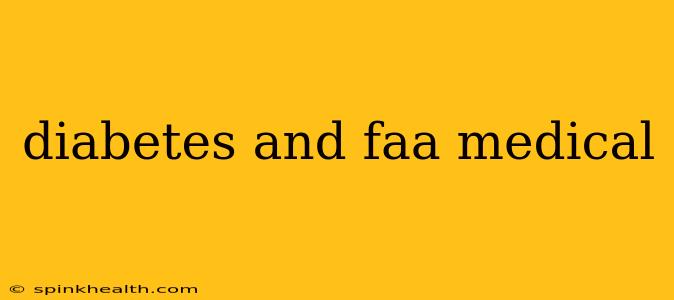The dream of soaring through the skies, of commanding a plane, is a powerful one. But for individuals living with diabetes, the path to becoming a pilot often presents a unique set of challenges. Securing a medical certificate from the Federal Aviation Administration (FAA) requires a rigorous assessment of health, and diabetes, a chronic condition requiring careful management, demands special attention. This journey isn't insurmountable, however. With careful planning, proactive management, and the right information, many individuals with diabetes successfully achieve their aviation aspirations.
Let's explore the intricate landscape of diabetes and FAA medical certification, addressing the common questions and concerns along the way.
What are the FAA's Requirements for Pilots with Diabetes?
The FAA's stance on diabetes and pilot certification is complex and depends on several factors, including the type of diabetes, its management, and the pilot's overall health. Generally, the FAA takes a conservative approach, prioritizing safety above all else. The specific requirements are outlined in the FAA's medical standards, which undergo periodic revisions. Staying updated on these guidelines is crucial for anyone with diabetes pursuing a pilot's license. The process often involves regular medical evaluations and detailed documentation of blood sugar control.
Can I Still Become a Pilot with Type 1 Diabetes?
The short answer is: potentially, yes. While Type 1 diabetes historically presented a more significant hurdle, advancements in diabetes management, including insulin pumps and continuous glucose monitoring (CGM) systems, have significantly improved outcomes and allowed for greater flexibility. However, achieving and maintaining exceptional blood sugar control is paramount. The FAA will scrutinize your medical history, treatment regimen, and consistent demonstration of stable blood glucose levels. Open and honest communication with your physician and the FAA's aviation medical examiner (AME) is key.
What about Type 2 Diabetes?
Similar to Type 1, the FAA's approach to Type 2 diabetes hinges on consistent and well-managed blood sugar levels. Excellent control, often achieved through diet, exercise, and medication, is critical. The FAA will want to see evidence of stable glucose levels over an extended period. The severity of the diabetes and any associated complications will also play a significant role in the FAA's decision.
How Does Insulin Treatment Affect My Chances of Getting a Medical Certificate?
The use of insulin itself isn't an automatic disqualifier. However, the FAA will need assurance that your insulin regimen is well-controlled and doesn't pose a risk to flight safety. This often means providing detailed records of your blood sugar levels, insulin doses, and any instances of hypoglycemia (low blood sugar) or hyperglycemia (high blood sugar). The stability and predictability of your blood sugar control are paramount.
What are the Long-Term Implications of Diabetes on My Aviation Career?
Maintaining a medical certificate with diabetes typically necessitates regular medical examinations and ongoing monitoring of your blood sugar levels. The FAA may require more frequent checkups than pilots without diabetes. It’s crucial to maintain open communication with your AME and diligently document your health status. Any significant changes in your diabetic management or the development of complications will necessitate further evaluation. The goal is to demonstrate consistent and reliable control, ensuring flight safety throughout your career.
What if I Experience a Hypoglycemic Event?
A hypoglycemic event is a serious matter and must be reported immediately to your AME. It will likely result in a temporary grounding while your health and management are reassessed. The FAA wants to understand the circumstances of the event, the measures taken to manage it, and any adjustments needed to your diabetes management plan.
Where Can I Find More Information on FAA Medical Standards?
The FAA's website is the definitive source for the latest medical standards and regulations. You can also consult with an aviation medical examiner (AME) who specializes in working with pilots with chronic conditions like diabetes. An AME can provide personalized guidance and support throughout the medical certification process.
The journey to becoming a pilot with diabetes is certainly more demanding, but it's not insurmountable. With dedication, meticulous management of your diabetes, and open communication with your healthcare providers and the FAA, you can significantly increase your chances of fulfilling your aviation dreams. Remember that proactive management and clear communication are your greatest allies in navigating this process.

